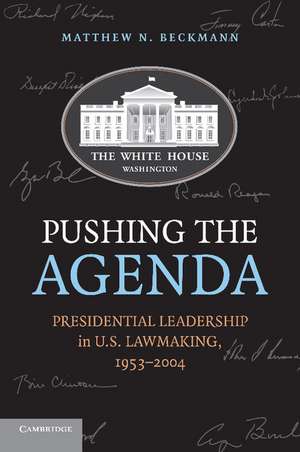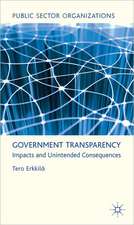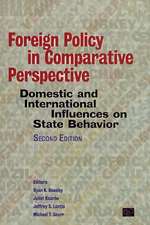Pushing the Agenda: Presidential Leadership in US Lawmaking, 1953–2004
Autor Matthew N. Beckmannen Limba Engleză Paperback – 14 feb 2010
Preț: 207.87 lei
Nou
Puncte Express: 312
Preț estimativ în valută:
39.78€ • 41.10$ • 33.11£
39.78€ • 41.10$ • 33.11£
Carte tipărită la comandă
Livrare economică 26 martie-09 aprilie
Preluare comenzi: 021 569.72.76
Specificații
ISBN-13: 9780521162913
ISBN-10: 0521162912
Pagini: 210
Ilustrații: 33 b/w illus. 1 map 22 tables
Dimensiuni: 150 x 226 x 18 mm
Greutate: 0.32 kg
Editura: Cambridge University Press
Colecția Cambridge University Press
Locul publicării:New York, United States
ISBN-10: 0521162912
Pagini: 210
Ilustrații: 33 b/w illus. 1 map 22 tables
Dimensiuni: 150 x 226 x 18 mm
Greutate: 0.32 kg
Editura: Cambridge University Press
Colecția Cambridge University Press
Locul publicării:New York, United States
Cuprins
1. Introduction; 2. A theory of positive presidential power; 3. Case study: pushing President Bush's 2001 tax cut; 4. Winning key votes, 1953–2004; 5. Signing new laws, 1953–2004; 6. The practice and potential of presidential leadership; Appendix: archival study technical details.
Recenzii
“Pushing the Agenda breaks new ground in studying ‘positive’ presidential power. The argument is compelling, the case studies illuminating, and the systematic data and empirical analyses eye-opening. This is a must-read book for all presidential scholars and one of the best books on the presidency in years. It has changed the way I think about presidential-congressional relations.”
– Charles M. Cameron, Princeton University
“For a long time, we have known that important elements of presidential power express themselves through bargaining, negotiating, and lobbying. In this timely book, though, Matthew Beckmann goes beyond the fact of this occurrence in order to scrutinize its character. Beckmann presents altogether new findings on whom presidents target within Congress and, suggestively, with what effect. This book is sure to be a standard citation in the empirical literatures on executive-legislative relations.”
– William Howell, University of Chicago
“Quantitative studies of presidential-congressional relations over the past two decades have thoroughly established just how significantly the larger context limits the scope of individual presidential sway in the legislature. They have been far less effective, however, at systematically evaluating what presidents are able to accomplish with their margin of influence. Until now. Matthew Beckmann’s Pushing the Agenda pushes our understanding of presidential agency to new heights. Creatively blending simple formal modeling with a rich array of empirical measures, and combing close examination of the single case of the 2001 Bush tax cuts with expansive multivariate analyses of the impact on key votes and new laws of ten chief executives from Eisenhower to Bush 43, Beckmann persuasively reveals how presidents can and do exploit early-game agenda setting and endgame vote lobbying to increase substantially their odds of success in shaping legislative policy making.”
– Mark A. Peterson, Professor of Public Policy and Political Science, UCLA School of Public Affairs
“A critical part of the new generation of presidency research, Matthew Beckmann’s Pushing the Agenda takes complex formal and informal theories seriously and then asks, ‘is this really how presidential influence works?’ His distinction between endgame, where votes matter most, and ‘earlygame,’ where cooperation over agendas matters most, constitutes an original theoretic as well as empirical contribution that academics in every setting will begin to take up in their own research. His analysis of presidential ‘influence’ within these two contexts breathes new life into a traditional concept rendered moribund by two decades of identification with measures of ‘voting success’ by demonstrating that when agendas matter and when votes matter, presidents matter and not at the margins either, but at the core. This book represents a foundation on which to construct a new generation of understanding and relevancy for presidency research.”
– Terry Sullivan, Hoover Institution, Stanford University, and University of North Carolina at Chapel Hill
“Matthew Beckmann’s Pushing the Agenda: Presidential Leadership in U.S. Lawmaking, 1953–2004 is a major contribution to our knowledge about presidential legislative power. He uses rich and innovative quantitative and qualitative analysis of the last half-century’s presidential-congressional interactions to explain presidential power on the Hill. His well-written and unique analysis focuses on presidential strategies and successes and failures of presidential influence in Congress. It is a must-read for anyone interested in the presidency and Congress.”
– James A. Thurber, American University
"an eminently readable, insightful, and carefully constructed book. It is recommended to scholars of the presidency and of the interaction between the executive and legislative branches. It would be a fine addition to undergraduate and graduate courses on these topics." -John D. Griffin, University of Colorado—Boulder, Congress & The Presidency
– Charles M. Cameron, Princeton University
“For a long time, we have known that important elements of presidential power express themselves through bargaining, negotiating, and lobbying. In this timely book, though, Matthew Beckmann goes beyond the fact of this occurrence in order to scrutinize its character. Beckmann presents altogether new findings on whom presidents target within Congress and, suggestively, with what effect. This book is sure to be a standard citation in the empirical literatures on executive-legislative relations.”
– William Howell, University of Chicago
“Quantitative studies of presidential-congressional relations over the past two decades have thoroughly established just how significantly the larger context limits the scope of individual presidential sway in the legislature. They have been far less effective, however, at systematically evaluating what presidents are able to accomplish with their margin of influence. Until now. Matthew Beckmann’s Pushing the Agenda pushes our understanding of presidential agency to new heights. Creatively blending simple formal modeling with a rich array of empirical measures, and combing close examination of the single case of the 2001 Bush tax cuts with expansive multivariate analyses of the impact on key votes and new laws of ten chief executives from Eisenhower to Bush 43, Beckmann persuasively reveals how presidents can and do exploit early-game agenda setting and endgame vote lobbying to increase substantially their odds of success in shaping legislative policy making.”
– Mark A. Peterson, Professor of Public Policy and Political Science, UCLA School of Public Affairs
“A critical part of the new generation of presidency research, Matthew Beckmann’s Pushing the Agenda takes complex formal and informal theories seriously and then asks, ‘is this really how presidential influence works?’ His distinction between endgame, where votes matter most, and ‘earlygame,’ where cooperation over agendas matters most, constitutes an original theoretic as well as empirical contribution that academics in every setting will begin to take up in their own research. His analysis of presidential ‘influence’ within these two contexts breathes new life into a traditional concept rendered moribund by two decades of identification with measures of ‘voting success’ by demonstrating that when agendas matter and when votes matter, presidents matter and not at the margins either, but at the core. This book represents a foundation on which to construct a new generation of understanding and relevancy for presidency research.”
– Terry Sullivan, Hoover Institution, Stanford University, and University of North Carolina at Chapel Hill
“Matthew Beckmann’s Pushing the Agenda: Presidential Leadership in U.S. Lawmaking, 1953–2004 is a major contribution to our knowledge about presidential legislative power. He uses rich and innovative quantitative and qualitative analysis of the last half-century’s presidential-congressional interactions to explain presidential power on the Hill. His well-written and unique analysis focuses on presidential strategies and successes and failures of presidential influence in Congress. It is a must-read for anyone interested in the presidency and Congress.”
– James A. Thurber, American University
"an eminently readable, insightful, and carefully constructed book. It is recommended to scholars of the presidency and of the interaction between the executive and legislative branches. It would be a fine addition to undergraduate and graduate courses on these topics." -John D. Griffin, University of Colorado—Boulder, Congress & The Presidency
Notă biografică
Descriere
Pushing the Agenda reveals the predictable nature of presidents' policy making opportunities and the strategies presidents employ to exploit those opportunities.



















